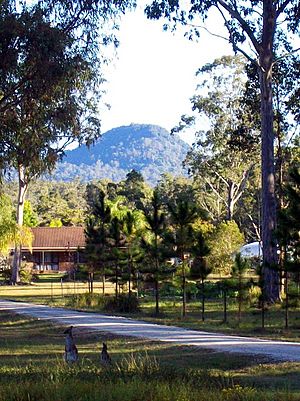Glenugie laurel facts for kids
Quick facts for kids Glenugie laurel |
|
|---|---|
 |
|
| Glenugie Peak, the type location of Cryptocarya floydii | |
| Conservation status | |
| Scientific classification | |
| Genus: |
Cryptocarya
|
| Species: |
floydii
|
The Cryptocarya floydii is a special tree found in the rainforests of Australia. People often call it the gorge laurel or Glenugie laurel. It gets the name "Glenugie laurel" from Glenugie Peak near Grafton, New South Wales, which is where this type of tree was first discovered.
You can find this tree growing in steep, rocky areas called gullies. It lives in northern New South Wales and nearby parts of Queensland. Its range stretches north to Bunya Mountains National Park and south to the upper parts of the Guy Fawkes River and Macleay River. This tree is quite rare. It's named after a famous rainforest expert, Alexander Floyd.
About the Glenugie Laurel
This tree is usually small, growing up to 15 meters (about 49 feet) tall. Its trunk can be up to 25 centimeters (about 10 inches) wide. The tree has a dark, thick crown of leaves. Its trunk often has an unusual shape, sometimes with grooves or bumps. It might even have several stems growing from the base.
The bark of the Glenugie laurel is dark and feels tough. It has wrinkles, bumps, and lines running up and down. The smaller branches are dark green to black. New leaf buds are covered in soft hairs.
Leaves of the Tree
The leaves of the Cryptocarya floydii are shaped like a spearhead. They are usually 30 to 110 millimeters (about 1 to 4 inches) long. They are also 10 to 35 millimeters (about 0.4 to 1.4 inches) wide. Each leaf has a long, pointed tip and a clear yellow line down the middle called a midrib.
Flowers and Fruit
The Glenugie laurel produces pale green flowers that smell nice. These flowers usually appear from October to November. Each flower has tiny petals, only about 1 millimeter long.
After the flowers, the tree grows shiny black fruits. These fruits are round, like a small ball, and about 12 millimeters (half an inch) long. They are a type of fruit called a drupe, which means they have a hard seed inside.
The fruit has only a very thin layer of flesh around its large seed. This means it doesn't offer much food for birds. Interestingly, these fruits look like the fruits of other plants, such as the vine Tetrastigma nitens. This is called mimicry, where one thing looks like another to gain an advantage. The seed inside the fruit has ridges and a pointed shape, which is common for many Cryptocarya seeds. The fruits are ready to eat from February to April.


